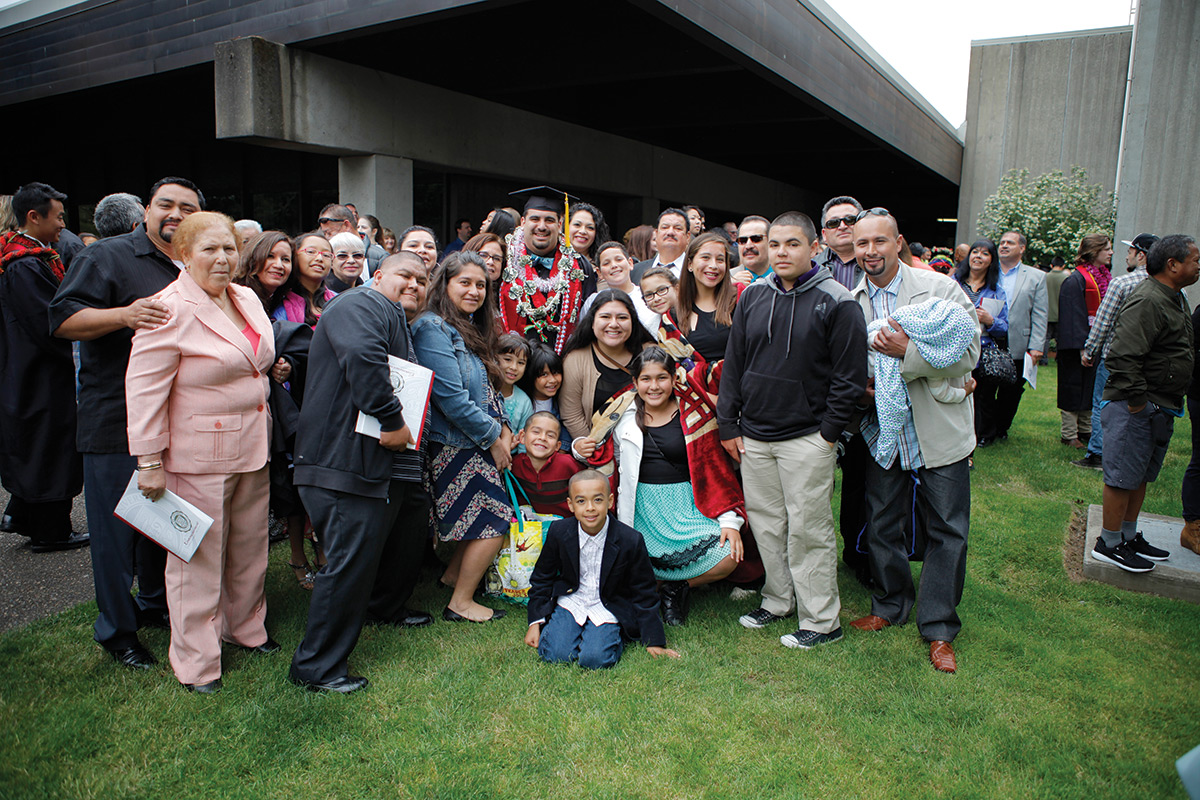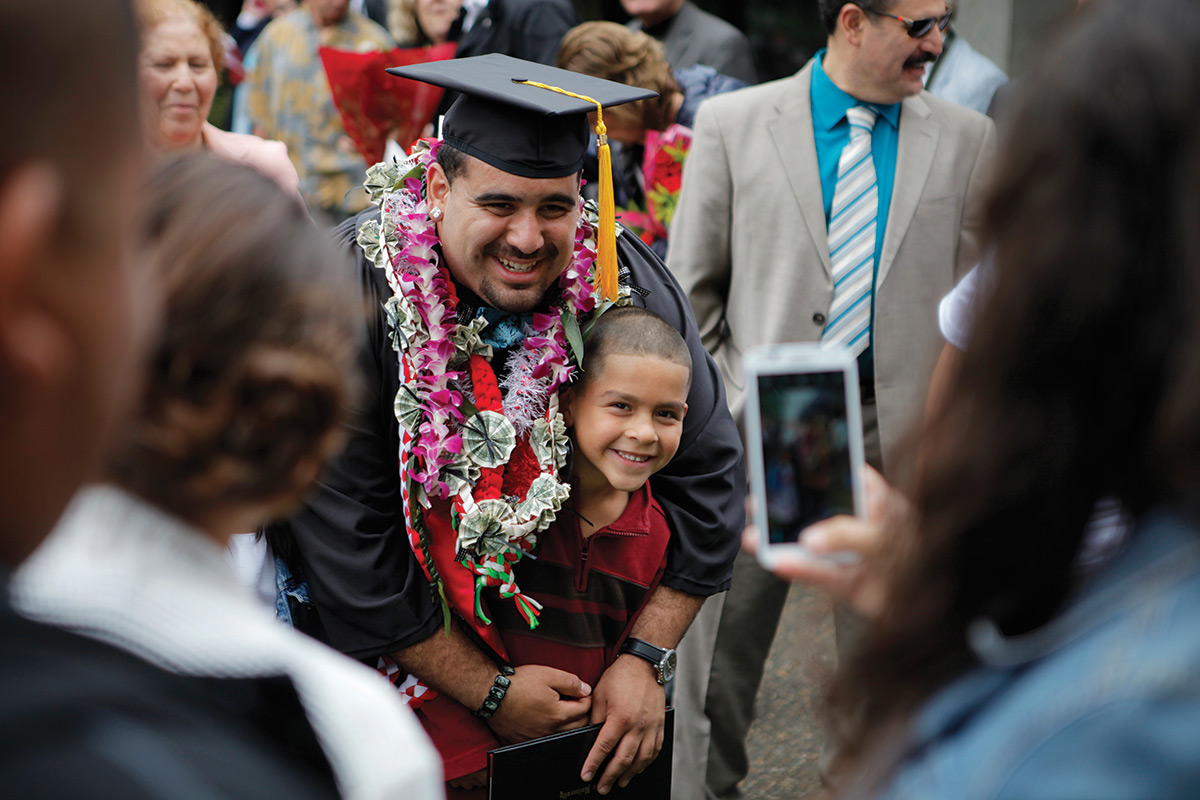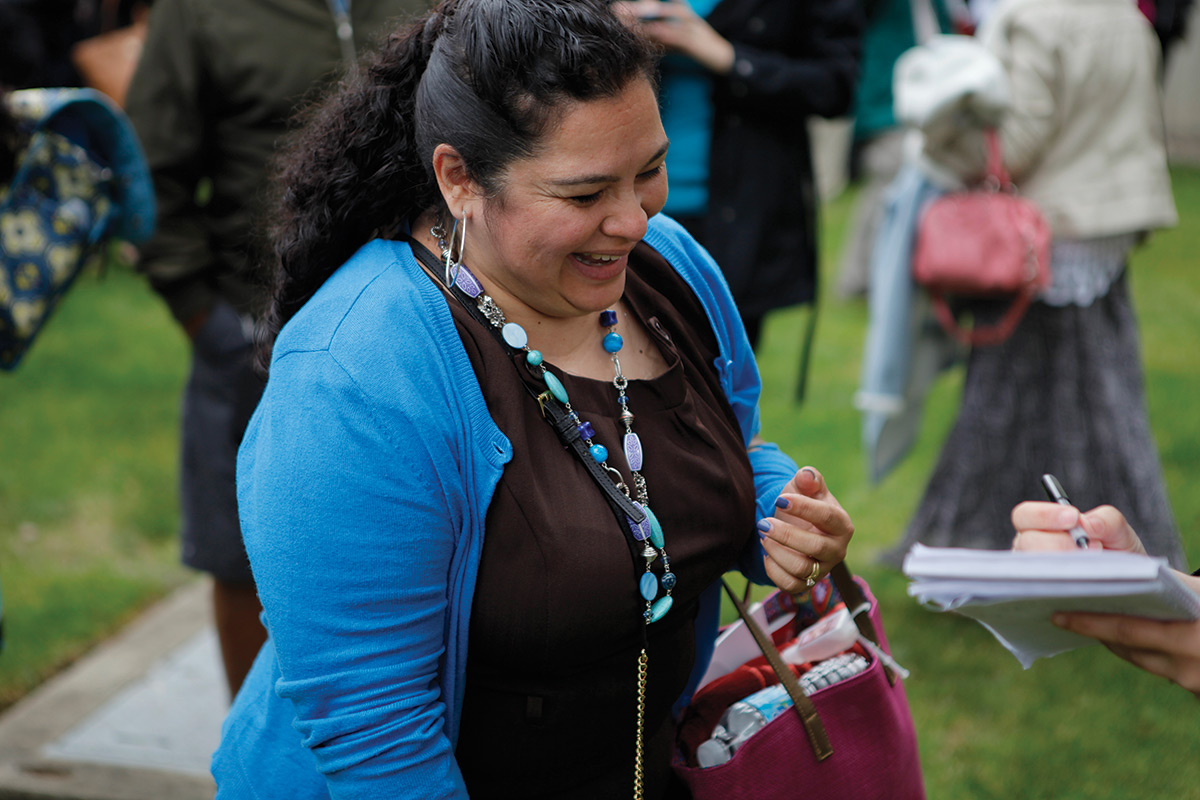
The Carrillo family is first in line.
Dressed in Sunday best, they bundle the younger children in blankets to fend off the spring morning chill, talking and laughing as they wait for the gates of Hanson Stadium to open.
It’s Commencement Day, May 16, 20175 and 26 members of the family have traveled from California to celebrate their son-nephew-brother-uncle Eddie Carrillo as he earns his bachelor’s degree in psychology.
They want good seats.
Before the ceremony starts, Eddie pops out to shoot the clan a smile and hello. His aunt and godmother, Maggie Portillo, bustles over to drape a lei around his neck — the first of what will, by noon, be a mass of congratulations encircling the defensive lineman from shoulders to chin.
A couple hours later, as Eddie’s full name — Jose Eduardo Carrillo — is called from the podium, the family erupts in cheers.
He isn’t just the firstborn grandchild on both sides of his family; he’s also the first born in the United States.
Walking across the stage with his bachelor’s degree, Eddie represents all his parents dreamed as they came north from Mexico and all they hope for the generation in his wake.
“This is a very proud moment for the whole family,” Portillo says. “He just makes us proud. Really proud.”
Both of Eddie’s parents, Jose and Silvia, were teenagers when their separate families immigrated to the United States.

Jose’s father had been a migrant farmworker for about 30 years, traveling back and forth every couple of years and sending money home.
At 16, Jose decided to join him, and shortly thereafter, his mother brought his younger siblings.
Silvia’s father, also an agricultural worker, died, leaving Silvia’s mother with four daughters, the youngest 7 and 9.
“I didn’t have any brothers. It was very hard for us,” Silvia said. “We decided to come and try our luck and hope for the best.”
Both families were undocumented when they immigrated, though they have since earned citizenship — Silvia when she was pregnant with Eddie’s younger sister, and Jose when Eddie was 9.
After moving, Silvia went to school and worked in fast food, eventually getting a job as an assistant in a law office, where she still works.
Jose’s first job was in a restaurant.
“I remember he told me he’d work an insane amount of hours, and his paycheck would come out to, like, $3 an hour. Something insane and illegal,” Eddie said.
Jose found work in another restaurant, where he started as a dishwasher and eventually became executive chef. A couple years ago, he became co-owner of that restaurant.
“Dad puts in a lot of hours,” Eddie said. “When I was in middle school, I remember he would go in at 7 in the morning and would come home at 7, 8, 9 at night. Then he’d go to sleep and go do the same thing the next day.
“They work a lot for us, for me and my sister.”
College, Eddie said, was something his parents always wanted for him.
“I think it would have been inappropriate for me not to take advantage of the opportunity,” Eddie said.
They pushed him to do his best and keep his grades up — “They still are, if I think about it, and they’re 700 miles away” — and they encouraged him to take advantage of his opportunities.
“In preschool, one of his teachers told me, ‘He’s a leader. He’s going to do big things,’” Silvia said. “I always told him, ‘Whatever you want to do, we’re behind you.’”
"Without coming to Pacific, I wouldn't be who I am." – Eddie Carrillo '15
That was even true when Eddie started playing football in high school.
“I don’t like that he plays football,” Silvia confessed. “But football was a big part of what he accomplished.”
It was football that first brought Eddie to Pacific University, where he was recruited to play as a defensive lineman. He was already interested in psychology, and the Pacific faculty sealed the deal.
“I knew I wanted to move away, for the chance to grow as a person,” Eddie said. “But I didn’t know if my family wanted me to. I didn’t want to disappoint them or make them sad.”
His mother said she cried a lot when he decided to go so far from home — but she always supported the decision.
“I wanted him to be the best he can,” she said.

At Pacific, football helped him keep busy and stave off homesickness, and he delved into the tight-knit community.
“I think when you go somewhere new, if you want to make the most of it, you have to come in with an open mind,” he said.
He found a group of friends who all valued family.
“We’re all family-centered people, we take care of one another,” he said.
He was a leader in the Student Athletic Advisory Committee, a member of the Psychology Club, got involved with Lu‘au, and started going to church regularly with a friend.
“I wouldn’t change coming to Pacific,” he said. “I feel like, without coming to Pacific, I wouldn’t be who I am.”
Eddie’s family dreamed that he would find success, and that he would be the beginning of the American era of the family legacy.
“I didn’t want him to be someone who had to work so hard,” said his father, Jose. “We’re doing good, but I want better things for him. With the education he can get, he can do better things.”
Eddie not only earned his bachelor’s degree in psychology this spring; he also was accepted to Pacific’s School of Professional Psychology, where this fall he will begin working on his master’s in applied psychological science. Eventually, he would like to earn a doctorate in clinical psychology.
Silvia is confident in his abilities: “When he gets something in his mind, he goes for it.
“I always told him to be the best he can: A lot of kids are watching.”
Eddie’s younger sister has already started college, and there are several others coming up behind: His godson is a junior in high school, starting to look at colleges, and another younger cousin is a high school softball player who Eddie showed around Pacific this spring.
“He’s a great example to the kids. They look up to him,” said Aunt Teresa Gonzalez. She points to one of the young cousins hanging on Eddie at Commencement:
“He says he’s going to work at Jamba Juice and go to Pacific, just like Eddie did,” Maggie said. “Eddie’s the first. That’s something big and inspiring.”
Eddie Carrillo '15, MA '17 went on to earn a master of applied psychological science from Pacific University in 2017. He is a mental health worker in the Sherwood, Oregon, school district. In 2024, he received the Pacific University Alumni Association Emerging Leader Award. Read More